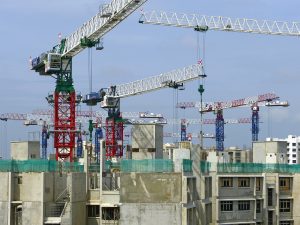Qualifying Certificate regime creates a win-win-win situation for the real estate developers, the capital markets, and policy makers
 On 6th February 2020, the Ministry of Law and Singapore Land Authority announced that the exemption of publicly listed housing developers with a substantial connection to Singapore from the Qualifying Certificate (QC) regime will be allowed.
On 6th February 2020, the Ministry of Law and Singapore Land Authority announced that the exemption of publicly listed housing developers with a substantial connection to Singapore from the Qualifying Certificate (QC) regime will be allowed.
Under the Residential Property Act (RPA), any housing developer that is not considered a Singapore company has to apply for a QC when it purchases residential land for development, other than from the government. Under the QC regime, it is required to complete the development within five years and dispose of all units within two years of completion. The extension charge payable for an extension of time is: 8% of the purchase price of the land for the first year extension, 16% for the second year of extension and 24% for the third and subsequent years. The number of unsold units will be taken into consideration when computing the charge. This is to ensure that such housing developers build and sell the residential units in a timely manner, and do not hoard and speculate in residential land.
A housing developer that is a Singapore company is not subject to the QC regime. Currently, a Singapore company is defined in the RPA as one that is incorporated in Singapore, and all its directors and shareholders are Singapore citizens or Singapore companies. This definition however means that publicly listed housing developers that are essentially Singaporean will not be considered a Singapore company. If they have one foreign shareholder, they will not be considered a Singapore company.
Publicly listed housing developers can apply for Qualifying Certificate regime exemption on the basis that they have a substantial connection to Singapore.
Table of Contents
The Qualifying Certificate regime exemption application will be assessed by reference to the following criteria:
1. Incorporation in Singapore;
2. Primary listing is on the Singapore Exchange and principal place of business is Singapore;
3. The chairperson and the majority of the company’s board are Singapore citizens;
4. A significantly Singaporean substantial shareholding interest in the company; and
5. Track record in Singapore.
The QC exemption changes will be implemented with immediate effect and reflected in legislation later this year.
The government is making no changes to the existing property market cooling measures, which were put in place to keep private residential property price increases in line with economic fundamentals. In particular, all housing developers continue to be subject to the prevailing Additional Buyer’s Stamp Duty (ABSD) regime. The regime requires, among other conditions, developers to sell all units in a residential project within a specified timeline, failing which they will be subject to the ABSD.
The Qualifying Certificate regime creates a win-win-win situation for the real estate developers, the capital markets, and policy makers, said Colliers International.
The QC rules, along with the additional buyer’s stamp duty (ABSD) – which was hiked to 30% (of which 25% is remittable) in July 2018 – have been seen by developers as a “double whammy”, both carrying hefty penalties if they do not sell all units in a project within the stipulated timeframe. This exemption will certainly be greeted with much relief, particularly for developers who are concerned about clearing their inventory and potentially having to pay for QC extension.
With the QC exemption, we think land bid prices for larger sites may potentially improve as developers may not need to provision for both ABSD and QC penalties for failure to sell all units within five (ABSD)/seven (QC) years. This could further help to promote efficiency in the marketplace as developers have a clearer picture of their risk exposure.
We believe the QC exemption for eligible developers could have a positive spin-off effect in that it may help to deepen the capital markets: 1) by attracting new listings of developers on SGX; or 2) encouraging re-listings of developers who have de-listed over the years due to the QC rules.
For the policy makers, the various eligibility criteria (as outlined below) set out will continue to position as a competitive global business hub and promote the hiring of Singaporeans into leadership and directorship roles.
This Qualifying Certificate regime exemption is a welcomed news amid an uncertain business environment. Although the ABSD remains unchanged currently, we feel that this could be a lever that the government can pull should there be a deep economic downturn. For instance, there could be flexible adjustments to the ABSD by reducing the tax, or extending the timeframe beyond five years. Such fine tuning of the ABSD, particularly in difficult times, could help to ensure the property market remains viable as well as facilitate the rejuvenation of large ageing properties.
CBRE commenting on the Qualifying Certificate regime said:
“This exemption will effectively remove the double whammy effect to some developers that have to contend with both the QC as well as the ABSD regimes. Successful applicants of the exemption of the QC regime will still have to ensure that all units in their residential projects are sold within a specified timeline under the overarching ABSD regime. Going forward, as such listed companies may not be categorised as a foreign entity following a successful application, some of these listed developers will be given a respite to continue to participate in the acquisition of land in the near to mid term.
“This is a clear indicator that the government is constantly monitoring and fine tuning its policies. This policy further strengthens their support for local developers, as it is difficult to qualify listed developers as a 100% Singapore company.”





